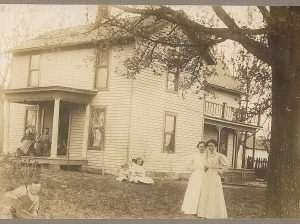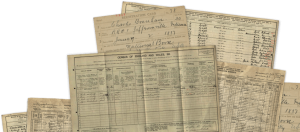Now that you have collected all the information that you can find on your ancestor it’s time to put it all together and start writing a good story for them.

I hope to give you some tips that will help you to write a profile for them that will bring them to life for others that will be searching for them and the descendants of the future.
ORGANIZE
Gather all the information that you have on your person. Your census, marriage licence, obituaries, pictures, veteran documents, deeds, wills, pictures, letters….everything you have.
Lay it out in order and create a timeline for them, from their birth to their marriage, the birth of children, their death etc. Recreate their life in the best order that you possibly can.
Decide where you want to begin the journey. If you are missing information on their childhood you might want to start in the middle.
Putting your ideas on index cards might make it easier for you to organize your info.
Decide how long you want the bio to be. Do you want it short and to the point or do you want to write a book?
Set some goals for yourself to write at least so many words per day/week/ month. Do you have a deadline?
Use your sources.
ASK QUESTIONS
Think of the struggles, and trials, high points and low points and write them down.
What was life like during their life time. Did they live during the depression, what were the conditions? Were there illness, health problems, deaths in the family?
How did they live/work? What were the details of the kind of work they did? Did they get up early, go to bed late? Was it hard work? How did they get to work? Did they walk, ride a horse, drive?
What was happening in the area where they lived? What kind of house did they live in? Was it rented or owned? How did they get the home?
What was happening in history? What was going on in the world and how did it affect them?
Write down the accomplishments they may have achieved.
Recreate the memories they left behind.
STAY FOCUSED
Do your best to tell your stories in the order that they happened. Write a little bit at a time. I’ve found that if I put it all down on paper first as I think of it, then go back and rearrange it in the order it should be helps.
Find a quiet time of the day when there are few distractions so that you can concentrate on your writing. Surround yourself with the memorabilia that will put you in the time and place that makes you think of that ancestor.
MAKE IT INTERESTING
Think about your own life and reflect on the memories that you have. Reflect on your own memories and use that as a guide as to what you might share about this person. What are some of the things you remember about growing up and put yourself into the life of your ancestor? Become them and think of what it was like for them. Tell their story. This person you are writing about is not just a name and date…a beginning and and end, they had a life filled with laughter, tears, love, heartache, joy and sorrow. Paint a picture of what their life was.
Go back and re read what you’ve written. Is it easy to read and descriptive? Is it interesting enough that it keeps the readers attention and the desire to read on? Is there information that is hard to follow? Cut out unnecessary words and avoid long sentences that will make the reading hard to follow.
DESCRIBE THEIR PERSONALITY
Were they a happy person, a worrier, a drinker, a trickster, a teaser? Were they a serious person? Boisterous? Quiet? Loud? What made people think this about them? Bring them to life with your words.
THE CORE
What is your key point to your story? Is there anything especially interesting about this person that you want to focus on? For instance, were they a war hero? Is that your main focus? Or perhaps they raised 10 children? You could focus on what it must have been like raising that many children, and what it took to do so. Maybe they were a womanizer and that is your main focus. Knowing your key point or core might make your writing a bit more focused.
USE TOOLS
Templates can be useful. If you are having a hard time knowing where to start perhaps a template could help you to get things organized and give you a layout.
There also helpful books that will give you ideas and questions that might strike some interest and memories in your thinking.
A dictionary or thesaurus are two tools that no writer should be without. Keep your words simple and understandable. Write like you would be telling the story yourself.
EDIT
Go back and edit your work. Sometimes it’s a good idea to get some new eyes on the project. When you’ve read and re read it so many times…you often miss mistakes that are otherwise easily recognizable. Ask for feed back and take it with a light heart. In the end…it’s your project…but be open to constructive criticism.
In conclusion I hope that gives you a place to start and some tips to make your writing experience just a little bit easier. As always is there is anything I can do to help in anyway don’t be afraid to leave me a comment below and ask. Do you have anything else you would like to add? Let me know that also!
Happy Hunting!
The Pierce Family Historian
Susan Holmes
